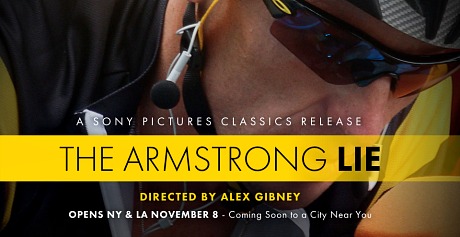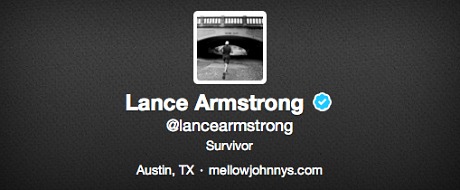You could say that Alex Gibney‘s The Armstrong Lie (Sony Classics, 11.8), which I saw a good portion of last night at Sony Studios, is only nominally about the ethical outing of Lance Armstrong, the competitive cycling superstar who won the Tour de France seven times (between 1999 and 2005) only to be stripped of his titles in 2012 for doping and thereby exposed as an opportunistic liar. The film is really about the worldwide belief system known as moral relativism, which basically says “it’s not cool to lie or cut corners or cheat or steal, but if you do these things…uhhm, well, you wouldn’t be the first and…uhhm, if they come after you it’s probably better to deny, deny and double-deny and give them no quarter until there’s absolutely no viable option other than to come clean. And you can even grow that into a plus if you play your cards right and wear the right attitude (i.e., I was blind but now I can see).”

Who are you in relation to Armstrong?, the film asks. Would you have played it any differently? If so in what ways? Would you have doped at all? Are you as ethically clean as you think you are? How many of us aren’t playing the game the Armstrong way (push on, grab the gold, sort out the ethics later on) and how many are? I have this feeling that there’s a spreading cancer out there and Armstrong is just one manifestation.
Gibney’s film is therefore a perfect film to argue about with friends over dinner. Because it’s about a lot more than just one highly willful and manipulative guy and what he almost got away with.
Against the general moral, ethical and spiritual backdrop of what aggressive success-seeking and Type-A careerism has become since the Reagan era (flaunt your McMansion, celebrate your egoistic magnificence, winning is the only thing, accumulate and implement), I don’t see Armstrong as particularly evil or heinous. I think he’s think he’s just another hustling athlete (like Tiger Woods or any brand-endorsing big-league baseball player who’s negotiated some huge bucks-up deal) who decided that winning was and is everything (like UCLA coach “Red” Sanders declared 63 years ago) and that doping his way through seven Tour de France wins was a workable option. He figured it wasn’t that bad given that a very high percentage of competitive cyclers were doping alongside him, and that given this reality he might as well be the smartest doper (i.e, the most covert and elusive) in cycling history. Which he pretty much became during the late ’90s and into the mid aughts.
(Armstrong probably wouldn’t have been busted at all if he hadn’t decided to come back and start racing again in ’09.)
Obviously his story took a highly unfortunate turn, leading to the absolute ruin of his reputation and a general feeling of ethical pollution among the contenders in a once-proud sport (not to mention the fans), but I think I understand why Armstrong decided that doping was probably workable and/or certainly finessable. He decided that becoming a super cycling champ would be a profound metaphorical triumph over the Grim Reaper — the ultimate fuck-you pushback — and that achieving this was more important than following rules imposed by tie-wearing people who didn’t know the cycling realm like he did.

Death hovered between October 1996, when Armstrong was first diagnosed with advanced testicular cancer at age 25, and February 1997, he was declared cancer-free. I don’t know what this does to your head but I can imagine. I’m guessing that it drives you insane, or scares you so badly that rational thought loses its foothold. You become a kind of howling madman for survival, and once you get past the threat of dying you resolve that beating the disease isn’t enough — you have to destroy the memory of death by becoming a kind of samurai superman, a gleaming champion who is so strong and invulnerable that Mr. D would take one look and say “aaah, fuck it…I’m gonna kill someone else…there are plenty of people out there I can take right now without effort….this guy is just too much grief right now…I’ll come back when he’s in his 70s or 80s.”
I can’t honestly say that I wouldn’t take some satisfaction if not enjoyment in beating down the memory of death if I had gone through what Armstrong went through. I don’t see myself as a sociopath who will cut any expedient corner and then lie or spin my way out of it if challenged, but…well, it’s hard to be definitive when you’re speculating. I’m disappointed in Armstrong for not living up to the metaphor that everyone attached when he beat cancer, but I don’t think he’s Beelzebub.
Armstrong has admitted to using growth hormones, cortisone, EPO, steroids, testosterone and blood transfusions during his peak years. He tells Gibney early on that “I didn’t live a lot of lies, but I lived one big one.” I need to see the whole film before writing a full review, but I have a pretty good idea of how well done it is (i.e., very) and where Gibney is basically coming from (i.e., pissed).









